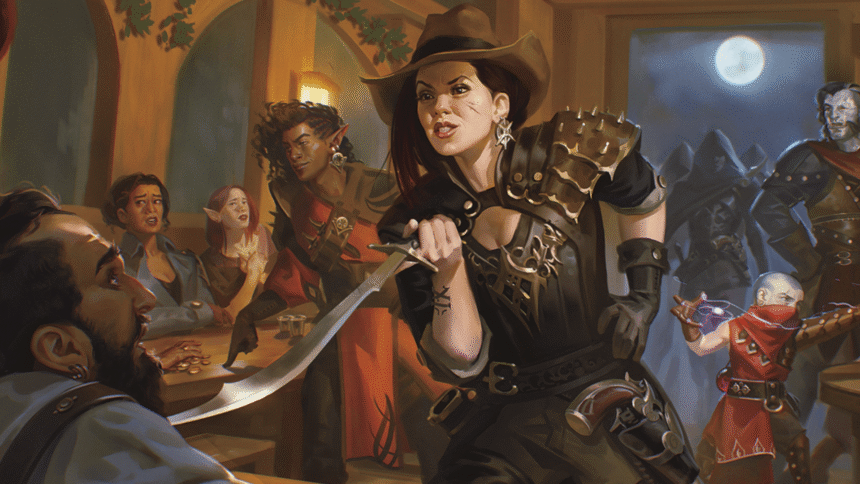Generative AI has gotten its deep studying tentacles into many elements of gaming life, and tabletop isn’t any exception—take Dungeons & Dragons for instance. Whereas Wizards of the Coast has endured controversy after controversy for by accident placing AI artwork in sourcebooks, and has a typically anti-AI stance, Hasbro’s CEO Chris Cocks has been on the file as, uh, not doing that.
Which is why I’ve discovered myself pleasantly shocked to search out out that Andrew Clayton, creator of the digital tabletop software program Foundry, has a two-boots-in-the-dirt hardline stance towards AI, as per an interview with RPGDrop earlier this week.
For those who’re enjoying any TTRPG on-line—be it D&D, Pathfinder 2nd version, Blades within the Darkish, no matter—chances are high you would possibly’ve completed so on Foundry. It is a little bit pricier and more durable to arrange when in comparison with one thing like Roll20, however makes up for it in spades with customisation, due to player-made modules you possibly can slot into your recreation.
Whereas the whole interview is attention-grabbing, Clayton very a lot speaks as the top of an organization would possibly—nothing overly corpo, nevertheless it’s all pretty polished and media-trained. When requested about AI, although? It is a textual content interview, so I am assuming a little bit of tone right here, however the phrase selection is downright stern.
“My very own private stance on that is that AI generated content material stays—for the foreseeable future—an exploitative expertise that unfairly harvests the mental property of artists, writers, and designers to provide soulless and by-product works with out their consent,” Clayton says.
“Till the authorized and moral challenges of generative AI are extra adequately addressed—and I don’t foresee this occurring—I don’t suppose generative AI will be responsibly employed in our business with out it being a betrayal of the inventive individuals who made the TTRPG business what it’s within the first place.”
This can be a far cry from the aforementioned phrases of Hasbro’s CEO, who late final 12 months talked an enormous recreation about “considerably and liberally” utilizing AI, including that his obvious 30-40 fellow D&D-ers (I suppose he is in a West Marches marketing campaign or one thing) had all been ingesting from the nicely of deep studying: “There’s not a single one who would not use AI someway for both marketing campaign growth or character growth or story concepts. That is a transparent sign that we should be embracing it.”
Clayton will not even go that far, although. Whereas he concedes that “generative AI content material can have a job to play in non-public dwelling video games, the place generative textual content or photographs can shortly complement the storytelling with an improvisational help or accessibility instrument,” he says that it is nonetheless “essential for the consumer to grasp it’s actively disenfranchising human creators.”
That is kind of the place I land on it, too. Earlier than the proliferation of AI, digital tabletop gamers have been grabbing photographs from Google for character reference, which is probably impolite to artists, however innocent in a utilitarian sense. And generally, gamers would then develop into hooked up sufficient to their characters to later fee art work, so I’ve usually seen it as a internet good.
And whereas I will not lose sleep over those self same gamers AI-generating art work or writing for his or her dwelling video games, the important thing distinction is that they are supporting instruments that—as Clayton says—are actively creating wealth off scraping the web and utilizing actual, precise human work with out consent.
I ought to make a counterpoint right here, although. Whereas Foundry VTT would not have officially-supported AI integration, I have seen modules that make use of AI in circulation earlier than. These are modules created by gamers, and I would not ask Foundry VTT to ruthlessly average them, however it’s value noting that that is Clayton’s private stake. Foundry, the corporate, is hardline towards AI, however the folks utilizing Foundry aren’t essentially stopped from doing so.
The true attention-grabbing meat right here is, nonetheless, in how Foundry VTT has an official partnership with D&D as of February final 12 months.
Hasbro’s Chris Cocks has been effusive about AI in tabletop, a stance that is at odds with the remainder of the business—together with WoTC’s enterprise companions, apparently. Wizards of the Coast has its personal insurance policies, and I might be shocked if anybody working there was jazzed in regards to the idea, however the reality is Hasbro owns WoTC and a Hasbro govt will, invariably, have the ultimate say.
However perhaps Foundry’ll have AI sooner or later, as soon as it is better-legislated or one thing? “No.” Clayton says. Yep, that appears fairly clear-cut.








